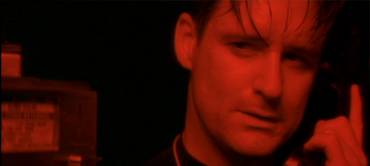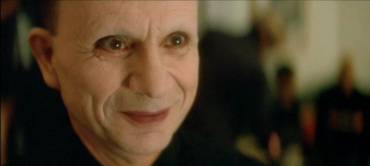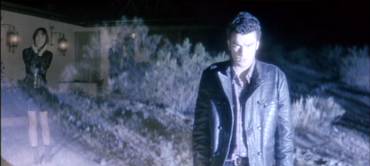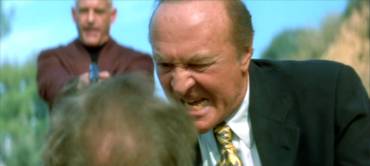|
"A
21st Century Noir Horror Film.
A graphic investigation into parallel identity crises.
A world where time is dangerously out of control.
A terrifying ride down the lost highway."
Above
are four descriptions of Lost Highway (1997)
written by David Lynch on the title page of the script for
the film by Lynch and Barry Gifford. They are four sentences
that sum up the mood of the film perfectly. They also go
a little way into scratching the surface of the narrative
and its meaning, neither of which are simple. As this film
has been a popular piece to discuss, analyse and deconstruct
from its release, it is extremely difficult to write anything
about this film that has not already been said. So, to begin
with at least, I will not attempt to...
Fred
Madison (Bill Pullman) and his wife Renee (Patricia Arquette)
live in a minimalist apartment in an unspecified town (as
is often the case with Lynch). Their conversation is as
minimal as their surroundings and neither of them seem happy
with the relationship. Fred is a thirty-something jazz musician
and an introverted personality. After video tapes of their
house keep turning up on the Madison's doorstep they call
the police to investigate. Following a strange encounter
at a party, Fred takes Renee home and discovers yet another
tape. On it he sees himself killing his wife. He is found
guilty of her murder and imprisoned, awaiting the death
sentence. At this point he 'appears' to change into another
person, Peter Dayton (Balthazar Getty).

Pete lives with his parents, he is twenty four and has no
recollection of how he ended up in prison. He goes back
to work as a mechanic where Mr Eddie (Robert Loggia), a
locally feared gangster, has him work on his cars. Pete
gets involved with Alice Wakefield (also played by Arquette),
who is Mr Eddie's girl. When Mr Eddie finds out about their
affair Alice and Pete plan to run away together…
…Before
this gets convoluted or boring enough to not do the film
any justice I will say no more than this: eventually Fred
resurfaces and the narrative finishes where it began, at
the Madison's home.
If
that synopsis seems a little dead, that is because I personally
think there is no place for a synopsis when discussing Lost
Highway. It is not something you can sum up in
a hundred words. It trivialises it and makes it sound like
a standard noir thriller, or if explained in detail can
take the magic out of watching the thing unravel before
you in its proper form. That is the thing with David Lynch
films – they do what all great cinema should, they take
you on a journey. But a journey in the world of Lynch is
different to any other. There are things any informed Lynchian
would expect, because as a true auteur he has his own distinct
style and set of paradigms and themes that run through all
his work. A high contrast, dark world. A sinister place.
A rumbling and dread provoking score. Slow and strangely
delivered dialogue. But beyond that is where the journey
really lies, because it is a journey into the unknown. And
the really uncanny thing with Lynch's stories is they are
often unknown, yet oddly familiar. He taps into a part of
the mind that very few artists of any medium can reach.
And I believe this is done most effectively with Lost
Highway.
As
I have said, its tricky territory covering this film, so
I will not bog the review down with too much heavy deconstruction,
as this film means something a little different to everyone,
yet it is impossible to discuss the movie, as with all Lynch
work, without some close textual analysis.

What
Lost Highway does, is what I consider good
art should, and that is to ask questions of the audience
without necessarily answering them. To begin with these
questions are small and obvious. Who rang at the buzzer
and said "Dick Laurent is dead"? Who is/was Dick
Laurent? Who is leaving the tapes? A dog barks and Fred
asks "Who the hell owns that dog?" The mysteries
are personified by the Mystery Man, a character that links
Fred with Pete and serves as a channel for many other seemingly
arbitrary connections. His first appearance is one of the
most striking scenes I have ever seen in cinema, and is
one of the reasons I decided years ago that film was to
be my life long mistress! It is at this moment in the film
that you realise you are playing by a different set of rules.
This is not a linear story. There are many moments one could
pin point as the classic 'Alice down the rabbit hole' moment
that Lynch is known for, some would argue the descent had
begun before the beginning of the film, I would say when
the Mystery Man first appears is the sure sign all is not
well with Fred. The dark beauty of the scene's mise-en-scene
and audio structure is a subject for a whole film studies
lecture, so I will leave it as known that this is a pivotal
scene. The following murder sequence, with Fred's literal
consumption by darkness and a truly terrifying viewing of
a final video tape that makes the origins of these items
and their contents a little clearer, leaves the audience
in freefall. You hit the ground with a hearty thump as Fred
Madison is convicted of the killing of his wife and sentenced
to death. Vertigo takes over once more when Fred transforms
into Pete. Lynch, the maestro of surreal noir, conducts
the ebbs and flows of interlocking reality with a nauseating
rhythm. Just as the reality the murder hits, the whole thing
is thrown into unknown territory with a metamorphosis.
The
tone changes with the character. Once out of prison, we
are confronted with an 'apple pie American' scene more fitting
with Blue Velvet
(1986), as Dayton reclines on a deck chair in the neat,
green garden of his parents' picket fenced home. Badalamenti's
score compliments this with an equally, misleadingly serene
piece. It is not long, however, until the sinister atmosphere
of the first act creeps in. There are beautiful moments
where Fred's consciousness lapses into Pete, triggered by
different elements; music, recollection and later Alice,
Andy and the Mystery Man. When Alice turns up in a car with
gangster Mr. Eddie, played by the same actress as Fred's
Renee, a fresh question is thrown into the mix, together
with discovering Mr. Eddie to be none other than Dick Laurent,
one is forced to accept there are two very distinctly overlapping
realities. The question that has to be answered some time
down the line is, 'which one is the true reality?' Maybe,
neither. Or even both. And here is where the individual
takes over.

Lost
Highway has been compared by some to a Cubist painting,
and I find this a good analogy. As there is a definite presence
of conventional form to a Picasso – i.e. one can make out
a figure or a landscape, Lost Highway similarly
shows a coherent story (two in fact).Yet both Picasso's
Cubist work and Lynch's film are abstracted from reality
by their unconventional use of form. I find this true of
many of David Lynch's work.
Some
find Lost Highway problematic because of
its abstract use of narrative, although there is much more
to glean from a Lynch plot than that of Dadaist or true
Surrealist cinema, for example Luis Buñuel's work.
Lynch merely uses a strange juxtaposition of unusual situations
to bring very real and understandable issues into view to
those who by more ordinary means would not receive such
satisfaction. I strongly believe he is to cinema what Kafka
is to literature, and it is known that he is a great influence
on Lynch's work.
Of
course with all this focus on David Lynch it is easy to
loose sight of the other contributors of this film. Gifford,
the co-writer, brought an edge to the film that makes it
stand up firmer to a literary based critique, one could
say a defining and distilling of Lynch's concepts. All the
performances are perfectly skewed and intense, with particular
note to Pullman, proving he can tackle indie work as well
as Hollywood roles, and a greatly unhinged supporting part
by Loggia as Mr Eddie, who was allegedly duped out of the
role of Frank in Blue Velvet. The one real
shock to me is how Balthazar Getty did not enjoy a more
high profile career after his role as Pete. He clearly displays
great talent and I feel it an injustice that since Lost
Highway he has mainly performed television parts.
Lost
Highway came at an important time for Lynch, as
the industry was beginning to doubt his potential after
the ill received Twin Peaks: Fire Walk With Me
(1992). It cemented his reputation as king of the arthouse
scene and opened the door for the family friendly though
often underrated The Straight Story (1999)
and the brother to Lost Highway, Mullholland
Drive (2001). It stands alone as an exceptional
piece of cinema, with its own rules and unique claustrophobia
and has the mark of a true auteur film where comparisons
can only really be made when referring to other works of
the same director.
A
direct port of the French MK2 release, there are few films
that present as big a challenge for the DVD format as Lost
Highway, with Peter Deming's cinematography
pushing almost to the limit at times how dark you can make
a picture and still register the image. In the cinema there
were shots that boasted only the hint of a coherent image,
and it's a credit to this transfer that we can still register
the image in the less forgiving digital format. That said,
we're still a little way short of perfect here – when the
limits are pushed, grain is more evident, the contrast loses
its edge and compression artefacts are sometimes visible,
as they are in areas of one colour, something there is a
lot of in the first half. Sharpness is generally good, though
there is still a little leeway for improvement, but this
is about as good as the film has yet looked on DVD. And
I do mean YET. The picture is framed 2.35:1 and enhanced
for widescreen TVs.

If
there are still a few issues with the picture, there are
none with the soundtrack, which as presented in DTS is terrific,
really doing justice to Lynch's typically superb sound design.
The sound quality and separation are first rate throughout,
assaulting you from every direction during Fred's manic
jazz performance, sending a jarring electronic scream around
you on the momentary appearance of the Mystery Man's face
on Renee's body and a thundering bass through your stomach
on Fred's nightmare recollection of murder. The 5.1 track
is also decent enough, but definitely takes second place
to the DTS.
What
really excited me about this edition was the possibility
of some great features. Finally a chance to hear more about
the making of the film and insight into its inspiration!
Sadly, I was sorely disappointed. The Unpublished
Interview with David Lynch 2005 sees the man
briefly shoot the breeze about several facets of the films
plot. A pointless menu lets you break up the short interview
into even shorter, themed, sections. And to top off the
pointlessness we can see Lynch waffle in three stunningly
different angles! What he says is hardly worth the effort,
the only half interesting thing mentioned is the psychogenic
fugue idea that got critics all of a lather on its first
mention nine years ago.
The
way this second disc is put together angers me, as it belittles
the wonderful film it accompanies. The set of Interviews
on location (1996) with stars and director are extended
from the interviews in the included Featurette, but what
they cunningly do is put these interviews before the featurette
on the menu, in order to make you think it's a totally separate
deal. Genius!
The
Making of is the loosest term
possible for the montage of behind the scenes footage that
passes for this feature. What we glean from this in the
way Lynch directs a picture as about as much as one would
if aimlessly wandering around the set in a daze. Who's Who
is another wonderful example of how these monkeys tried
to make something out of nothing for this second disc. You
click on a name, and, wow, you get a few second clip of
that character in the film, in absolutely no context! If
this is some patronising attempt to make it clearer to the
audience who these characters are then it surely doesn't
belong with a film that has the greatest respect for its
audience's intelligence!
The
Teaser and Trailer
are what one would expect, a showcase of the Lynchian mode
summed up as quickly as the format allows.
Now
the only thing that went some way to redeeming this catastrophe
for me was the aforementioned Featurette.
In its short running time it shows an insight into how Lynch
works with interviews (that are duplicated elsewhere on
the disc) and on set footage. It is basically putting other
elements of the disc together into a coherent structure,
and if you ask me, it is the only worth while addition which
could have so easily been put on the first disc and not
wasted peoples time and precious plastic!
A
classic Lynch work and notable piece of cinema history tarnished
by a 'special' edition DVD set that is nothing more than
a piece of cynical marketing. If I was David Lynch I would
have not allowed this edition as it stands as it mars the
stature of the work it is supposed to compliment. Oh, for
a Criterion-like, extras-packed Lynch DVD!
|